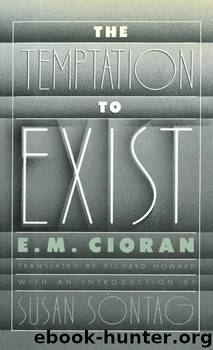The Temptation to Exist by E. M. Cioran Richard Howard

Author:E. M. Cioran, Richard Howard [Cioran, E. M.]
Format: epub
ISBN: 978-1-61145-553-3
Publisher: Arcade Publishing (Perseus)
Published: 2011-11-20T16:00:00+00:00
STYLE AS RISK
INURED to a purely verbal art of thinking, the sophists were the first to occupy themselves with a meditation upon words, their value, propriety, and function in the conduct of reasoning: the capital step toward the discovery of style, conceived as a goal in itself, as an intrinsic end, was taken. It merely remained to transpose this verbal quest, to assign as its object: the harmony of the sentence, to substitute for the play of abstraction the play of expression. The artist reflecting on his means is therefore indebted to the sophist and organically related to him. Both pursue, in different directions, the same genre of activity. Having ceased to be nature, they live as a function of the word. Nothing original in them: no link that binds them to the sources of experience; no naivete, no “sentiment.” If the sophist thinks, he so dominates his thought as to do with it what he likes; since he is not carried away by it, he directs it according to his caprice or his calculation; he treats his own mind as a tactician; he does not meditate, he conceives, according to a plan as abstract as it is artificial, certain intellectual operations, opens a breach in concepts, proud to reveal their weakness or to grant them, arbitrarily, a solidity or a sense. “Reality” is not his concern: he knows it depends on the signs which express it and which must, simply, be mastered.
The artist, too, proceeds from the word to the actual: expression constitutes the only original experience of which he is capable. Symmetry, arrangement, the perfection of certain formal operations represent his natural milieu; he lodges there, breathes there. And since he aims at exhausting the capacity of words, he tends, more than to expression, to expressiveness. In the closed universe he inhabits, he escapes sterility only by that continuous renewal afforded by a game in which nuance acquires idolatrous dimensions and in which a verbal chemistry achieves compounds inconceivable to a naive art. So deliberate an activity, if it is located at the antipodes of experience, approaches, on the other hand, the extremities of intellect. It makes the artist who dedicates himself to it a sophist of literature.
In the life of the mind, there occurs a moment when style, transforming itself into an autonomous principle, becomes fate. It is then that the Word, as much in philosophical speculations as in literary productions, reveals both its vigor and its void.
A writer’s manner is conditioned physiologically; ne possesses a rhythm of his own, urgent and irreducible. One does not conceive a Saint-Simon changing the structure of his sentence nor condensing his prose, tending to laconicism by the effect of a willed metamorphosis. Everything in him required that profusion of interlinked, luxuriant, mobile phrases. The imperatives of syntax must have pursued him like a torment and an obsession. His breath, its cadence, even its catches, imposed that fluid and ample movement which surmounts the solitude and the barrier of words. There was in him a pedal point so different from those flute accents which characterize French.
Download
This site does not store any files on its server. We only index and link to content provided by other sites. Please contact the content providers to delete copyright contents if any and email us, we'll remove relevant links or contents immediately.
The remains of the day by Kazuo Ishiguro(8965)
Tools of Titans by Timothy Ferriss(8360)
Giovanni's Room by James Baldwin(7316)
The Black Swan by Nassim Nicholas Taleb(7099)
Inner Engineering: A Yogi's Guide to Joy by Sadhguru(6784)
The Way of Zen by Alan W. Watts(6591)
Asking the Right Questions: A Guide to Critical Thinking by M. Neil Browne & Stuart M. Keeley(5751)
The Power of Now: A Guide to Spiritual Enlightenment by Eckhart Tolle(5743)
The Six Wives Of Henry VIII (WOMEN IN HISTORY) by Fraser Antonia(5493)
Astrophysics for People in a Hurry by Neil DeGrasse Tyson(5172)
Housekeeping by Marilynne Robinson(4434)
12 Rules for Life by Jordan B. Peterson(4298)
Double Down (Diary of a Wimpy Kid Book 11) by Jeff Kinney(4257)
The Ethical Slut by Janet W. Hardy(4240)
Skin in the Game by Nassim Nicholas Taleb(4232)
Ikigai by Héctor García & Francesc Miralles(4232)
The Art of Happiness by The Dalai Lama(4120)
Skin in the Game: Hidden Asymmetries in Daily Life by Nassim Nicholas Taleb(3986)
Walking by Henry David Thoreau(3950)
